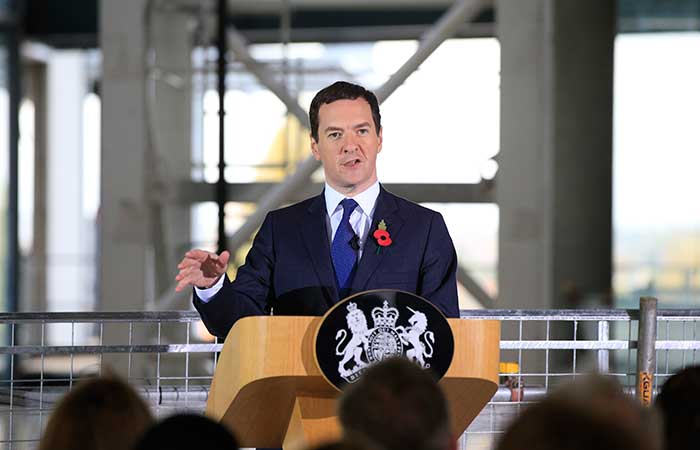
Photo: PA
Chancellor George Osborne announced in a speech in London this morning that DCLG, as well as Department for Transport, the Department for Environment, Food and Rural Affairs and the Treasury itself, had agreed funding plans ahead of the announcement on 25 November. Departments had been told to prepare for cuts between 25% and 40% from 2016/17 to 2019/20.
Osborne said today resource spending budgets for these departments would be cut by an average of 30% in total over the next four years. The deal applies to the department's own revenue spending, and does not include the local government settlement, which will be set out at the review, alongside the capital funding settlement.
“These savings will be achieved by a combination of further efficiencies in departments, closing low value programmes, and focusing on our priorities as a country,” he said.
“These provisional settlements apply to the day-to-day resource spending of the central departments – they are not the capital budgets of these departments.”
The chancellor said the reductions in government spending, which are intended to lead to a surplus by the end of the parliament, were vital for the country’s economic security.
“There’s no opportunity in a bankrupt country,” he said.
“Of course, hard decisions do have to be taken. Some of what we need to do will be controversial – it always is when you fight to do the right thing in government
“But remember this: at this Spending Review, we will set out a plan to spend around £4 trillion over the Parliament.”
Osborne reiterated that the NHS budget would be increased by £8bn over the Spending Review period, while there will also be a continuation of welfare reform.
This will include revisiting the government’s controversial planned reductions in tax credits, which were rejected by the House of Lords last month.
“The perverse incentives created by the welfare system has kept wages low and prevented people from taking on more work,” Osborne said.
“As I have said, this Spending Review will deliver a new type of economy – moving from a low wage, high welfare, high tax one to a higher wage, lower welfare, lower tax one.”
Responding to the announcement, Stephen Joseph, chief executive of Campaign for Better Transport, said he feared the cut in transport funding would hit the transport networks people use on a daily basis, whilst big road and rail schemes would remain untouched.
“We await details, but we fear this will mean more potholes in local roads, more cuts in local bus services, and less funding for safe cycling and walking routes.”
The Local Government Association said that councils would face a £16.5bn funding gap by the end of the decade if authorities also received a 30% Spending Review cut.




















